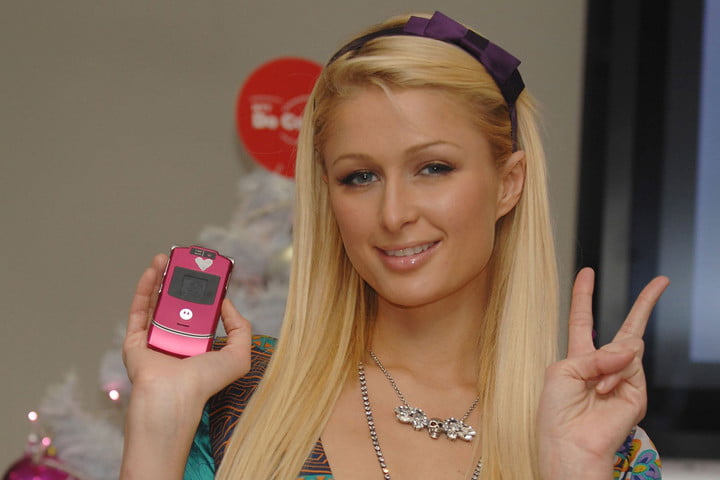No doubt geed up by that photo of Daniel Day-Lewis texting on his flip phone in Central Park, Motorola has announced its plans to drag the Motorola RAZR, better known as Paris Hilton’s mid-noughties clamshell companion, out of retirement. Naturally, the handset has undergone a facelift in an attempt to restore its former glory, now boasting a foldable touchscreen, an ersatz Touch ID, and a $1500 price tag, because, as Apple and Off-White have taught us, people will only buy things if they are irreconcilably expensive. But is it enough? Much has changed since the phone’s launch in 2004, and, just like the Nokia 3310 and Renée Zellweger, people remember things for what they were, rather than whatever they’re trying to be now.
As landmarks go, 2004 and 2019 feel centuries apart. 2004 was a time when Amy Winehouse was on the up, and Pete Doherty on the down, but in a way that still glamorous enough that he topped 2004’s NME cool list. Hell, it was a time when NME was still held up as a index of culture’s cutting edge. It was a time when people still went to Camden for fun, to listen to skinny boys playing guitars in dimly-lit bars. But no wants to watch anaemic white boys pouting and moaning along to ‘indie-rock’ anymore unless it’s a Celine show.
Now we have techno, music to which you can dourly two-step your Sundays away in a Central European ex-industrial backlot guarded by a capricious man with facial tattoos and referred to by Italian expats as a church. We have Thank U, Next. Not a plucked string to be heard, sweetie. And if, between Hedi and The Kooples, le look Doherty can make no end of comebacks in the time that’s since passed, my guess is that a phone probably can too.
2004 marked the beginning of another technological behemoth, though one that quick became a much more insidious facet of modern life than the humble Razr. In February of 2004, Facebook was launched by pasty Harvard student Mark Zuckerberg as a means to catalogue his fellow students’ photos and ‘basic’ information. The story’s a pretty long one from here, but tl;dr: Zuckerberg’s been mining our data for the past 15 years. With an arsenal comprising its namesake platform, WhatsApp and Instagram, the conglomerate has the monopolising chokehold on global communications that Motorola only comes close to achieving in its wet dreams. I mean, the chances are that you’re only reading by clicking a handy link on one of the above. But, given that every picture you upload or message you send is likely being used to construct a more efficient AI version of you, maybe a phone with a shoddier internet connection wouldn’t be such a bad idea.
Facebook wasn’t the year’s only noteworthy internet moment of 2004. 2004 saw the launch of k-punk — the 2004-16 blog of the late Mark Fisher the “post-rave John Berger”. You should look this up in your own time, it’s too exhaustive and fascinating to document here, but k-punk basically changed the course of contemporary pop-cultural critique with it’s urgent, acerbic posts on panning Dido, The Hunger Games, and the Scottish Referendum. Fisher would offer a counter-Nietzschean reading of Chantelle Houghton’s Celebrity Big Brother victory as easily as he would extoll Rihanna’s A Girl Like Me as an album that “holds open the utopian possibility of a black music liberated from the dead phallic weight of hip hop”, describing SOS as a celebration of “the jouissance of losing one’s autonomy” in love.
He also posited the notion of ‘capitalist realism’, “the widespread sense that not only is capitalism the only viable political and economic system, but also that it is now impossible even to imagine a coherent alternative to it,” a feeling I felt most acutely when recently on a short-haul flight with BA and I had to PAY for a fucking M&S sandwich – that’s right, sis, the halcyon days of aviation are long gone, oxygen masks basically operate on a coin-release. But in designating this ideological framework, he also pointed out the glitches in the veneer it hopes to present as flawless, spurring on hope for the possibility of an existence beyond its confines. And by God we all need some hope nowadays. I mean, things were hardly rosy back then, what with a freshly re-elected George W. Bush and Tony Blair hellbent on pushing the world ever closer to nuclear midnight. But politics is a world loth to change, and we’re still here caught in a wave of illogically nationalist despots from Britain to Brazil, all, still, hellbent on pushing the world that bit closer to nuclear midnight.
But less of the fire and brimstone: though much may have changed, almost as much seems to have remained, and we’re all the better for it. And to be honest, there are many things from 2004 far more incongruous than a flip-phone that have managed to make a return: if Ariana Grande can revive the trend misspelled Japanese tattoos, then surely there’s room for the new-look RAZR. Admittedly, there are a few things Motorola will need to brush under the carpet, like that little collab they did with Dolce & Gabbana; but my arms are open wide: Hello again, Moto.
